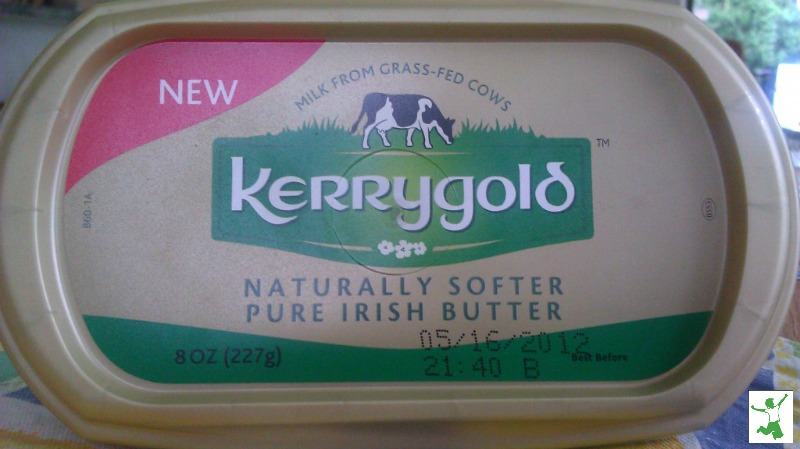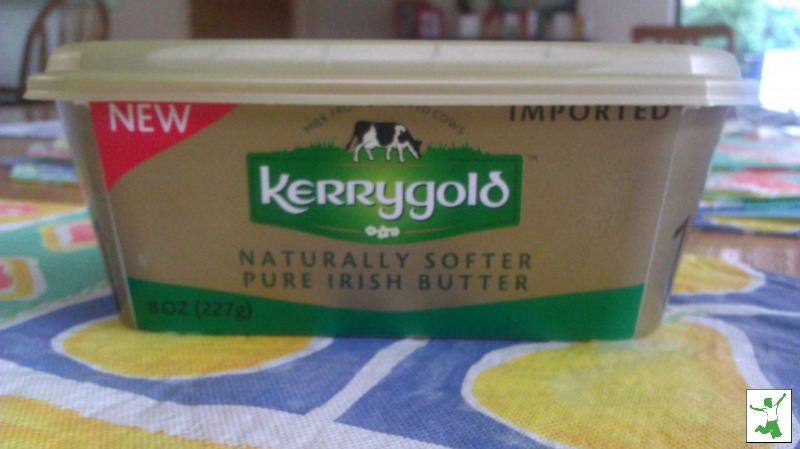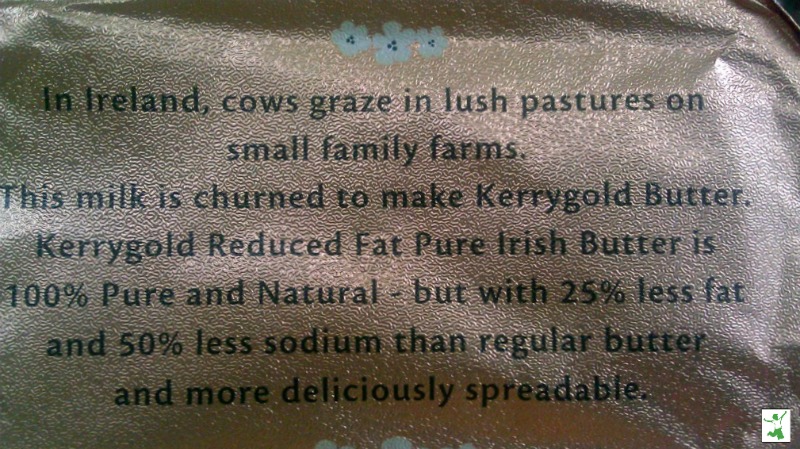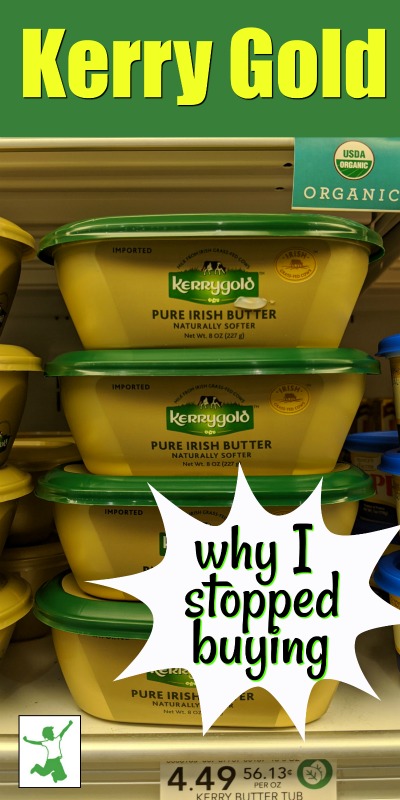Table of Contents[Hide][Show]
Kerrygold is marketed as grass-fed and all-natural, but the tub butter has concerning ingredients, dangers and marketing ploys to consider before buying.

Kerrygold, without question, is probably one of the best store butters you can buy. I myself have been using it for years for cooking.
The milk is from grass-fed cows and even though the cream used to make Kerrygold Butter is pasteurized, it is the best choice available to most folks who do not have access to raw butter from a small farm or who simply don’t want to use their precious raw butter for cooking.
I also know that many of you out there use Kerrygold too. When I conducted a Butter Poll on this blog awhile back, by far the most used butter (out of 1,500 or so total votes) was Kerrygold which received way more votes than even Organic Valley butter.
So what’s the problem?
My husband brought home the “new” Kerrygold butter the other day. On the surface, it looked fine. Nowhere on the outside of the package was there any indication that there was a problem with this butter. Here’s what it looks like.

I got suspicious with the “new” label, however. There’s nothing “new” about butter. That’s what I like about it after all!
Another tip-off that there was a problem lurking was the proclamation on the label that this “New Kerrygold” was “naturally softer”.
When I first saw the “naturally softer” words, I thought that meant that the butter was whipped and hence more spreadable. I don’t know about you, but I don’t want air whipped into my butter. This is a surefire way to get less product and get charged the same price for the privilege if you know what I mean.
I made a mental note to tell my husband not to buy this butter again because it was whipped and not as good a value.
But then, it got way worse…
Is Kerrygold Butter Grass-fed?
I took off the lid to the new Kerrygold package and saw the following words:

I had become a victim of the Big Fast One!
Kerrygold is stealthily selling LOWFAT butter and guess what? You get to pay the same price for the cheaper quality!
NOWHERE on the outside of the label did it say that the butter was low-fat. The ingredients said simply: pasteurized cream and salt the same as the commercialized Amish butter at the supermarket.
I daresay that this marketing ploy will be fooling a lot of folks who desire to buy full-fat grass-fed butter.
It seems that some butter brands have adopted what companies making substitutes for butter have been doing for years.
I have become very tuned in to these labeling tricks and manufacturer games over the years. When it comes to packaging, I double-check the ingredients along with the manufacturing processes every few months. This is even for products that I’ve been buying for years.
But how many people really do this?
Ingredient Bait and Switch
You NEED to be doing this!
Manufacturers are changing ingredients and packaging all the time! The primary intent of these “improvements” is to increase product sales and profitability. Your health is, sadly, of little to no concern in the grand scheme of things.
Reducing the fat content in its butter will skyrocket profits for Kerrygold as they will make the same per unit for the butter and yet be able to sell the skimmed cream to other companies to make ice cream or whatnot thereby increasing revenue substantially.
If you buy Kerrygold, I’m not telling you to stop buying it. I’m only telling you to beware of this new packaging nonsense and be sure what you buy is what you intend: full-fat butter!
By the way, if you are wondering why I love full-fat butter, you might want to educate yourself on the low-fat scam by learning about the history of butter vs margarine in the United States.
As for me, I will be returning this product to the store for a full refund. It is falsely advertised after all. I had no way of knowing it was a low-fat product until I opened it.
Manufacturer Response
I received this email from Kerrygold following the widespread sharing of this article. I find it very hard to believe that my blog suddenly brought this packaging error to their attention.
Do they have NO ONE on the production line in charge of quality control? This was not a difficult problem to identify. Could we have a bit of spin going on here? Perhaps so.
Dear Sarah,
Your blog has brought to our attention a packaging error of which we were unaware. While Kerrygold does sell a Reduced Fat & Sodium Butter the pack you show on your blog is 100% full fat butter which has been packed with the incorrect inner seal. There is no deliberate intent on our part to mislead our valued consumers or to misrepresent our product although we regret the confusion this is clearly creating.
We are working to identify how much product has been released into the market with the incorrect packaging so that we can replace it as soon as possible. In the meantime we would appreciate your assistance in clarifying the misunderstanding to your readers. We would love to provide further clarity — our email is [email protected] — and we are happy to answer any specific questions you and your readers may have in relation to the product.
With thanks & regards,
The Kerrygold Team
Why I No Longer Buy Kerrygold
I wanted to let all of you know that I no longer buy even the traditional Kerrygold brick butter in foil packaging. Why? A good friend visited Ireland and traveled extensively to a number of grass-based dairy farms.
This credible source told me that while the cows that provide cream for the Kerrygold butter are definitely on pasture and hence “grass-fed”, they receive supplemental GMO animal feed as well especially during the winter months. The local community and citizenry in Ireland concur and will tell you as much if you are in the area.
So, the word on the street is that Kerrygold is not legitimately pastured either.
Butter from cows that get GMO feed introduces the very real possibility of Roundup residue in the butter.
Thanks but no thanks!
While I have not been able to confirm this story 100%, I trusted the credibility of the information enough to permanently switch to another brand (I currently use this one).
I use this butter for cooking in addition to the homemade pastured raw butter I make for non-cooking purposes.
I also no longer recommend Kerry Gold in my Shopping Guide.
What about Organic Valley butter as an alternative to Kerry Gold? While I am not happy about Organic Valley’s policy that disallows member farmers to sell raw milk on the side to their community (treating them more like medieval serfs than the independent business owners that they are), I find this less onerous than deceptively feeding animals GMO feed without clearly informing the end consumer.









Hi Sara, I agree with you, “something smells fishy”. I noticed a change on the label of my salted foil brick of butter. It no longer says milk from grass -fed cows. Hmmm????
I bought this exact same product pictured and the foil inside did not say that it was lowfat. I honestly do this it was a mistake in labeling.
Yep, looks like it was a labeling error. Mine has the correct one, nothing mentioned on it being lowfat.
I don’t believe them. I think it’s highly probable it was intentional. How is it remotely possible a little blogger like me found a HUGE labeling error (per their email response) on a NEW product line that their Q/A folks would have been all over to prevent. Either their quality control is completely incompetent or it was intentional to test the market to see how folks react to the lowfat label insidiously placed inside the product lid instead of prominently on the front as customers are used to.
And, if it was a mistake, the incompetence of their Q/A department warrants no longer buying their product on that fact alone! How do we know the full fat butter is in fact full fat if the labels are all messed up? They likely don’t even have a handle on what product is going into what tubs.
So you are in fact saying they are intentionally deceiving consumers by putting a different product (lower fat butter) in the tub than what the exterior package says? If that were true (and I think it’s an honest mistake), couldn’t they get in trouble (fined? sued?) for that?
Yes, big companies get away with this all the time. The USDA is very lax about enforcement of production errors but then they come down hard on small farms that have done nothing wrong with no complaints from consumers.
Sarah- we are not saying it is your mistake for pointing out their mistake, but you didn’t just say “they put the wrong label” and you aren’t even retracting any statements after learning more about the situation! The label on the inside didn’t change what the product is! I think they are just trying to market to a different sector who are bent on buying margarine and other spreads.. so kudos to them for evolving but not changing the quality of their products.
I would also like to know how in the world a little blog like mine happened to find such a huge product labeling mistake when they have who knows how many salaried employees on their quality control team? Again, spinning the truth seems extremely plausible to me.
@ Winni I certainly respect your opinion, but I disagree. My blog is not meant to be an authority on every issue in the health universe. I call the shots as I see them and stick by what my gut instinct tells me. Something smells fishy to me about the whole thing. My job is to faciliate the truth. They put out a flawed product. That is their mistake. It is not mine for pointing it out.
@Rene No recall announced that I have heard as of yet …
If Kerrygold stops selling the blocks and replaces with the whipped tub, i will not buy it any longer.
same
I am not playing devil’s advocate, I actually think they made an innocent mistake and are being crucified for it. You make the assertion: “Kerrygold is stealthily selling LOWFAT butter and guess what? You get to pay the same price for the cheaper quality!” I would probably verify that before printing it because though I am no lawyer I believe it is illegal to make a claim like that without proof. Especially since you gave the company no opportunity to respond. It is one thing to give your opinion, and another to state as fact that a company is selling something as lowfat when it isn’t actually lowfat. It is also disappointing me that you are unwilling to admit that perhaps it is an innocent mistake, instead accusing them of CYA behavior. I thought for sure a retraction would be forthcoming; but I was wrong. As a researcher I value well researched opinions and articles and this one hurts your credibility, in my opinion.
Funny you posted this today, because I just bought two containers of this butter. Unfortunately, they no longer sell the sticks where I used to buy them. So I just checked my inner label on my “new” container, and it has the same old information it’s always had. Mine did not say anything about it being low-fat. So they may have legitimately mislabeled a few of these. Otherwise, I’m being scammed into believing mine is still full fat when in fact, it’s not.